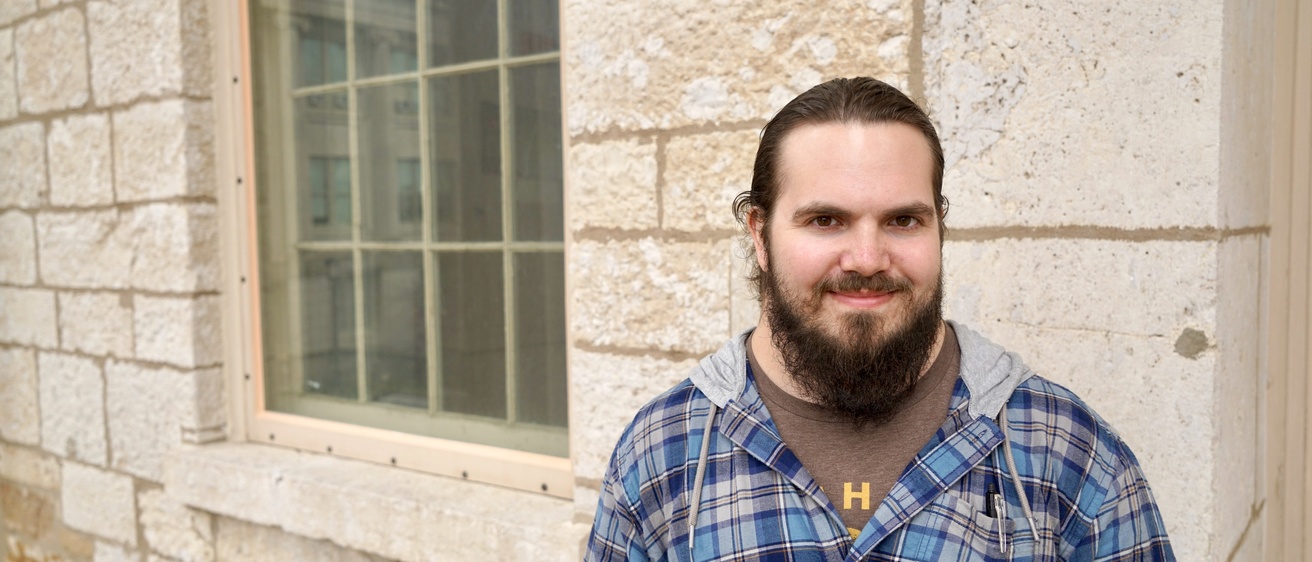Alex Pauls has always known he wanted to earn a doctoral degree. However, once he started teaching, he told himself that dream would never come to fruition.
Now, he is pursuing a doctorate in school psychology, a certificate in applied behavior analysis (ABA) to become a board-certified behavior analyst (BCBA), and a Master of Arts in educational measurement and statistics.
Applied behavior analysis is the use of behavioral principles to address socially significant behavior. ABA is often used in teaching and for skill and language acquisition for individuals with autism, but it has many uses.
“My clinical and research interests are in the reduction of severe and challenging behavior for individuals with and without disabilities,” says Pauls.
Pauls is also completing a fellowship with Iowa’s Leadership Education in Neurodevelopmental and Related Disabilities (ILEND) during his first year in the school psychology program. He will present research as part of a symposium at the Association for Behavior Analysis International Convention this May.
“It’s an immense honor to have a spot in a symposium at the most prestigious conference in my field so early in my career,” says Pauls.
The goal of ILEND is to train leaders and advocates in the field of disability. As part of his fellowship, Pauls says he has spent time with people across a variety of disciplines to see how different clinicians and researchers approach disability, meet with state and federal legislators to inform them about ILEND, and complete two research projects that will be presented to faculty and legislators.
How did Pauls go from accepting that he likely wouldn’t enter a Ph.D. program to attending Iowa and finding success so quickly? It’s simple: He saw a way to make a difference.
Pauls previously earned a Bachelor of Arts in social science education and a Master of Arts in history from the University of Northern Iowa. His first job post-college was teaching social studies and special education for individuals with emotional and behavioral disorders at a juvenile detention center.
“This center serves individuals with the most severe emotional and behavioral disorders in the state,” Pauls says. “It was atypical from many teaching jobs, especially first teaching jobs, but I learned a lot. It greatly reframed the views I hold regarding education and society.”
Pauls later transitioned to another role where he taught students with intellectual and developmental disabilities at a high school in Ankeny, Iowa. In this role, he worked with students who displayed severe and challenging behavior, namely aggression and self-injury, who Pauls says were not being adequately served by the school.
“It was yet another reminder of some glaring issues in our educational system that were not going to be remedied easily or rapidly,” Pauls says. “The kiddos were great, but the systemic issues felt overbearing.”
Pauls says the longer he taught, the more disillusioned he became with the K-12 system. Then, one day, he attended a training about ABA and immediately felt inspired.
“The content really clicked with me, and I saw immediate potential to help a wide variety of kids,” Pauls says. “After a great deal of reflection and discussion, I decided to leave my role as a K-12 teacher and enter a PhD program at Iowa.”
Pauls says that the University of Iowa, and Iowa City as a whole, have always had an allure to him. As a professional learning about ABA, he also wanted to work with Clinical Assistant Professor Matthew O’Brien and Assistant Professor Kelly Schieltz, both from the University of Iowa Stead Family Children’s Hospital Department of Pediatrics.
“The University of Iowa has a long history of producing world class clinicians, and I wanted to be one of them,” Pauls says.
The clinical work and research Pauls has done with O’Brien has been his favorite part of his experience thus far.
“It’s immensely rewarding to work with someone who’s not only a great clinician and researcher, but also just a great human being,” Pauls says. “He’s taught me a lot and has been pivotal to my development into the professional I want to be.”
Pauls and O’Brien are currently working on two research projects. One examines different strategies to reduce automatically reinforced self-injury, while the other looks at the effects of stimulant medication on challenging behavior.
Pauls is most passionate about figuring out meaningful ways to help children who display severe and challenging behavior, such as aggression, destruction, noncompliance, and self-injury. Pauls says this means working with their caregivers and school teams to develop functionally sound strategies that fit everyone’s needs.
He also hopes to expand the practice of ABA and grow the number of board-certified behavior analysts practicing in Iowa.
“Currently Iowa, and the nation, are unable to meet the demand for ABA services and I’d like to change that,” says Pauls.
After graduation, Pauls wants to work in, and eventually direct, an academic medical center that helps individuals, both with and without disabilities, who display severe and challenging behavior. In that role, Pauls hopes to conduct research that can have a positive impact on the field of ABA in addition to having students interested in ABA training under him. Pauls sees this as an opportunity to give back to the field and develop the next generation of practitioners.
“At the end of the day, I want to do what’s best for kids and their families,” Pauls says. “If I’m able to help the kids I meet through clinics and schools experience meaningful change, that’s enough impact for me.”
